语言学期末复习
语言学纲要期末复习重点
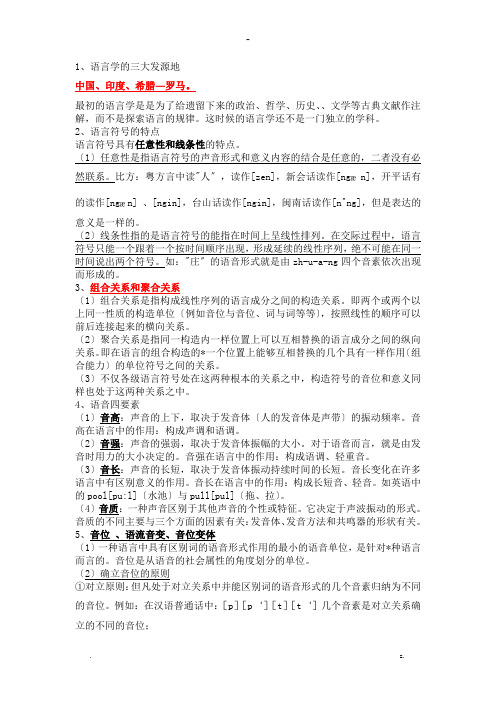
1、语言学的三大发源地中国、印度、希腊—罗马。
最初的语言学是是为了给遗留下来的政治、哲学、历史、、文学等古典文献作注解,而不是探索语言的规律。
这时候的语言学还不是一门独立的学科。
2、语言符号的特点语言符号具有任意性和线条性的特点。
〔1〕任意性是指语言符号的声音形式和意义内容的结合是任意的,二者没有必然联系。
比方:粤方言中读"人〞,读作[zen],新会话读作[ngæ n],开平话有的读作[ngæn] 、[ngin],台山话读作[ngin],闽南话读作[n^ng],但是表达的意义是一样的。
〔2〕线条性指的是语言符号的能指在时间上呈线性排列。
在交际过程中,语言符号只能一个跟着一个按时间顺序出现,形成延续的线性序列,绝不可能在同一时间说出两个符号。
如:"庄〞的语音形式就是由zh-u-a-ng四个音素依次出现而形成的。
3、组合关系和聚合关系〔1〕组合关系是指构成线性序列的语言成分之间的构造关系。
即两个或两个以上同一性质的构造单位〔例如音位与音位、词与词等等〕,按照线性的顺序可以前后连接起来的横向关系。
〔2〕聚合关系是指同一构造内一样位置上可以互相替换的语言成分之间的纵向关系。
即在语言的组合构造的*一个位置上能够互相替换的几个具有一样作用〔组合能力〕的单位符号之间的关系。
〔3〕不仅各级语言符号处在这两种根本的关系之中,构造符号的音位和意义同样也处于这两种关系之中。
4、语音四要素〔1〕音高:声音的上下,取决于发音体〔人的发音体是声带〕的振动频率。
音高在语言中的作用:构成声调和语调。
〔2〕音强:声音的强弱,取决于发音体振幅的大小。
对于语音而言,就是由发音时用力的大小决定的。
音强在语言中的作用:构成语调、轻重音。
〔3〕音长:声音的长短,取决于发音体振动持续时间的长短。
音长变化在许多语言中有区别意义的作用。
音长在语言中的作用:构成长短音、轻音。
如英语中的pool[pu:l]〔水池〕与pull[pul]〔拖、拉〕。
语言学概论期末复习重点
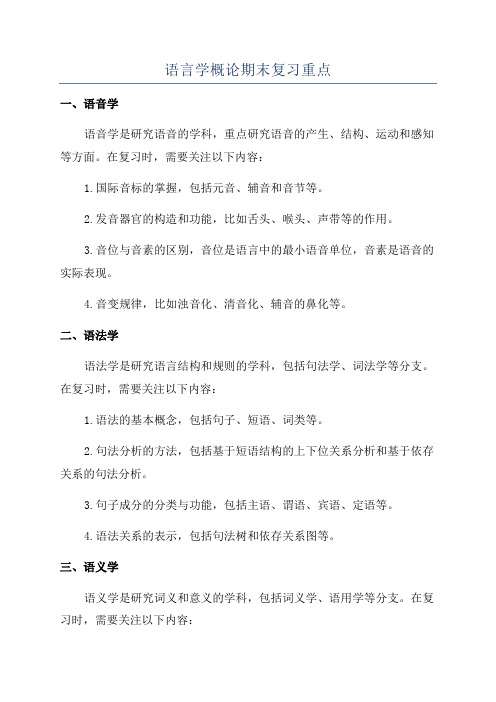
语言学概论期末复习重点一、语音学语音学是研究语音的学科,重点研究语音的产生、结构、运动和感知等方面。
在复习时,需要关注以下内容:1.国际音标的掌握,包括元音、辅音和音节等。
2.发音器官的构造和功能,比如舌头、喉头、声带等的作用。
3.音位与音素的区别,音位是语言中的最小语音单位,音素是语音的实际表现。
4.音变规律,比如浊音化、清音化、辅音的鼻化等。
二、语法学语法学是研究语言结构和规则的学科,包括句法学、词法学等分支。
在复习时,需要关注以下内容:1.语法的基本概念,包括句子、短语、词类等。
2.句法分析的方法,包括基于短语结构的上下位关系分析和基于依存关系的句法分析。
3.句子成分的分类与功能,包括主语、谓语、宾语、定语等。
4.语法关系的表示,包括句法树和依存关系图等。
三、语义学语义学是研究词义和意义的学科,包括词义学、语用学等分支。
在复习时,需要关注以下内容:1.语义的基本概念,包括词义、句义、语篇意义等。
2.词义的分类,包括编码词义和概念词义等。
3.语义关系的表示,包括隐性关系和显性关系等。
4.语义义原的掌握,比如用来描述词义的最小单位,可以用来解释多义、歧义、同义等现象。
四、语用学语用学是研究语言在特定情境中的使用和理解的学科,包括语用规则、言语行为等方面。
1.言语行为的分类,包括表示、指示、陈述、询问等。
2.言语行为的成分,包括言辞、语境、意图等。
3.语用规则的掌握,比如礼貌原则、言外之意等。
4.言语行为的实现方式,包括直接言语行为和间接言语行为等。
以上仅为语言学概论期末复习的一些重点内容,学生可以结合教材和课堂笔记进行更深入的学习和理解。
此外,复习时可以参考相关的案例和实例,加深对语言学原理的理解和应用。
语言学纲要复习资料
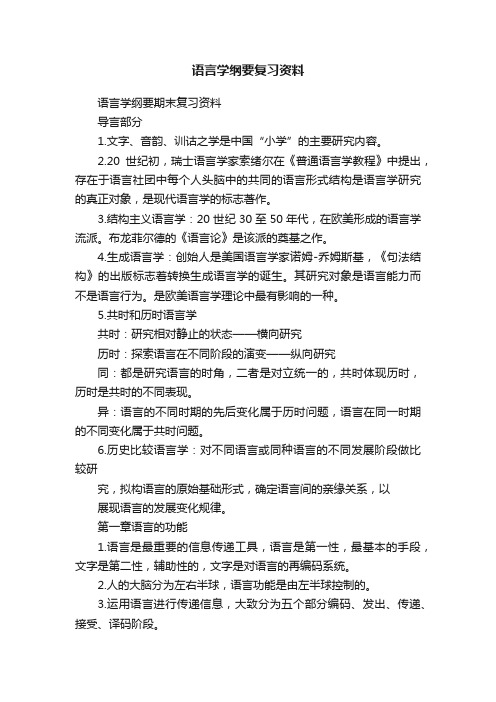
语言学纲要复习资料语言学纲要期末复习资料导言部分1.文字、音韵、训诂之学是中国“小学”的主要研究内容。
2.20世纪初,瑞士语言学家索绪尔在《普通语言学教程》中提出,存在于语言社团中每个人头脑中的共同的语言形式结构是语言学研究的真正对象,是现代语言学的标志著作。
3.结构主义语言学:20世纪30至50年代,在欧美形成的语言学流派。
布龙菲尔德的《语言论》是该派的奠基之作。
4.生成语言学:创始人是美国语言学家诺姆-乔姆斯基,《句法结构》的出版标志着转换生成语言学的诞生。
其研究对象是语言能力而不是语言行为。
是欧美语言学理论中最有影响的一种。
5.共时和历时语言学共时:研究相对静止的状态——横向研究历时:探索语言在不同阶段的演变——纵向研究同:都是研究语言的时角,二者是对立统一的,共时体现历时,历时是共时的不同表现。
异:语言的不同时期的先后变化属于历时问题,语言在同一时期的不同变化属于共时问题。
6.历史比较语言学:对不同语言或同种语言的不同发展阶段做比较研究,拟构语言的原始基础形式,确定语言间的亲缘关系,以展现语言的发展变化规律。
第一章语言的功能1.语言是最重要的信息传递工具,语言是第一性,最基本的手段,文字是第二性,辅助性的,文字是对语言的再编码系统。
2.人的大脑分为左右半球,语言功能是由左半球控制的。
3.运用语言进行传递信息,大致分为五个部分编码、发出、传递、接受、译码阶段。
4.思维方式的差异更多地体现在不同语言在表达思想时语法方面的特点。
5.思维能力的普遍性和思维方式的特殊性,与语言的性质是密切相关的。
6.语言和言语的区分是索绪尔提出的,言语不稳定,语言是稳定的。
7.语言是符号系统,是最重要最典型的符号,符号的形式和意义是约定,无必然联系。
征候是事物本身的特征,它传递的某种信息,可以通过它自身的物质属性来推断。
(远处的炊烟、病人的脉象、气色、舌苔、口气,罪犯的指纹,脚印)8.音————义————心理现实————客观现实语言符号指称反映客观现实:是四维时空中外在于人的所有存在,当下和历史上所有的人物、事物、现象以及他们的相互关系及其变化。
语言学纲要期末复习参考资料

导言一、填空题1.语言学是研究语言的学科,语言是语言学的研究对象。
语言学的基本任务是研究人类语言的规律,使人们懂得关于语言的理性知识。
2.中国、印度、希腊—罗马是语言学的三大发源地。
3.我国传统语言学包括文字学、音韵学、训诂学等三门分支学科,合称“小学”。
二、判断题1.综合各种语言的基本研究的成果,归纳成语言的一般规律,这是具体语言学的任务。
(错)2.世界上有几千种语言,有些语言的研究已经比较深入,大部分语言的研究还很不够,甚至还没有人去研究。
(对)三、名词解释1.普通语言学以人类一般语言为研究对象,探究人类语言的起源、发展、本质。
探究人类语言内部结构的共性及普遍规律的语言学门类。
2.应用语言学狭义的应用语言学指语言教学、文字的创制和改革、正音正字、词典编纂等,广义的应用语言学还包括与计算机有关的及其翻译、情报检索、语音识别、自然语言处理等。
3.小学在中国古代,小学先从教授字的形、音、义开始,就把研究文字、训诂、音韵方面的学问统称为小学。
小学一直是经学的一部分,包括音韵学、训诂学、文字学三个分支学科。
第一章一、填空题1.从语言的社会功能上看,语言是人类独有的最重要的交际和思维的工具;从语言的内部结构上看,语言是一套音义结合的符号。
2.文字是建立在语言基础之上的最重要的辅助交际工具,旗语之类是建立在语言和文字基础上的特殊领域的辅助交际工具。
二、判断1.从理论上来说,句子的长度是可以无限的。
(对)2.语言是文字基础上产生的人类最重要的交际工具。
(错)3.文字始终是从属于语言的。
(错)4.思维离不开语言,语言也离不开思维。
(对)5.语言和思维互相依存共同发展。
(对)6.在现代社会,文字比语言更加重要。
(错)7.文字也是人类最重要的交际工具。
(错)8.语言是组成社会的一个不可缺少的因素。
(对)9.会不会说话是人类和动物的根本区别之一。
(对)10.思维能力是全人类共同的,语言是各民族不同的。
(对)11.思维离不开语言,聋哑人不能掌握语言,所以聋哑人不能进行思维。
语言学纲要期末复习要点
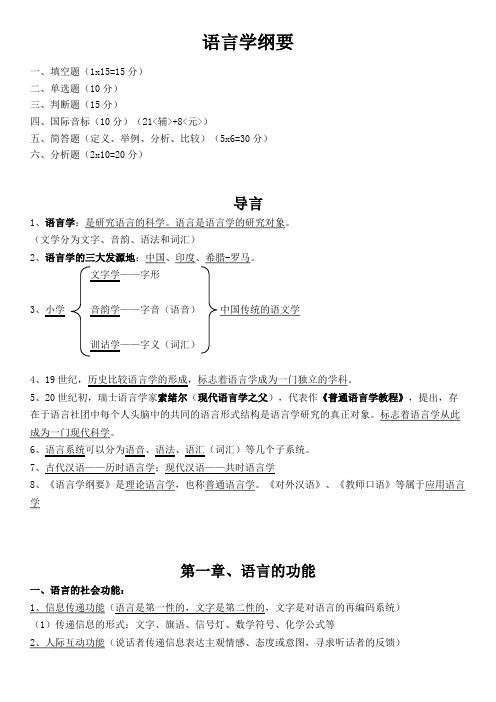
语言学纲要一、填空题(1x15=15分)二、单选题(10分)三、判断题(15分)四、国际音标(10分)(21<辅>+8<元>)五、简答题(定义、举例、分析、比较)(5x6=30分)六、分析题(2x10=20分)导言1、语言学:是研究语言的科学。
语言是语言学的研究对象。
(文学分为文字、音韵、语法和词汇)2、语言学的三大发源地:中国、印度、希腊-罗马。
3、小学中国传统的语文学4、19世纪,历史比较语言学的形成,标志着语言学成为一门独立的学科。
5、20世纪初,瑞士语言学家索绪尔(现代语言学之父),代表作《普通语言学教程》,提出,存在于语言社团中每个人头脑中的共同的语言形式结构是语言学研究的真正对象。
标志着语言学从此成为一门现代科学。
6、语言系统可以分为语音、语法、语汇(词汇)等几个子系统。
7、古代汉语——历时语言学;现代汉语——共时语言学8、《语言学纲要》是理论语言学,也称普通语言学。
《对外汉语》、《教师口语》等属于应用语言学第一章、语言的功能一、语言的社会功能:1、信息传递功能(语言是第一性的,文字是第二性的,文字是对语言的再编码系统)(1)传递信息的形式:文字、旗语、信号灯、数学符号、化学公式等2、人际互动功能(说话者传递信息表达主观情感、态度或意图,寻求听话者的反馈)二、语言的思维功能:(了解)1、大脑左半球(左脑)控制语言功能以及相关的计数、分类、推理等功能,掌管抽象的、概括的思维2、大脑右半球(右脑)在音乐等艺术感知,人的面貌识别、立体图形的识别、整体把握能力、内在想象力等方面起主要作用,掌管不需要语言的感性直观思维。
3、聋哑人是有思维的。
第二章、语言是符号系统1、符号:(1)概念:指一个社会全体成员共同约定的用来表示某种意义的记号或标记Eg:烽火戏诸侯、电梯的着火铃(2)包括:形式与意义两个方面2、征候:是事物本身的特征,它传递的某种信息,可以通过它自身的物质属性来判断。
语言学概论期末复习重点
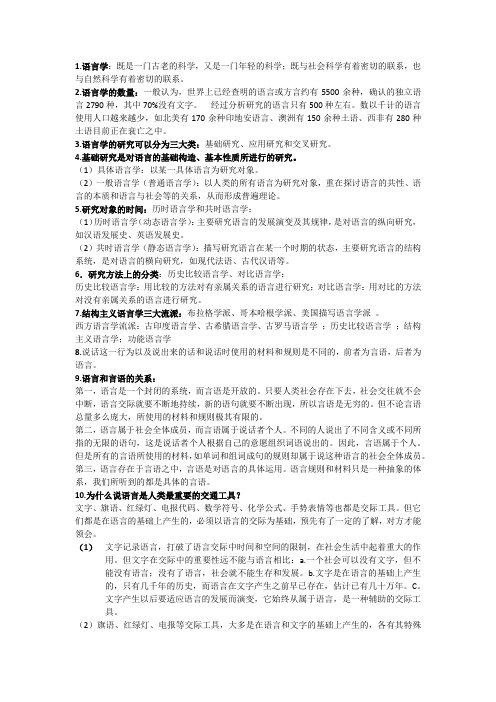
1.语言学:既是一门古老的科学,又是一门年轻的科学;既与社会科学有着密切的联系,也与自然科学有着密切的联系。
2.语言学的数量:一般认为,世界上已经查明的语言或方言约有5500余种,确认的独立语言2790种,其中70%没有文字。
经过分析研究的语言只有500种左右。
数以千计的语言使用人口越来越少,如北美有170余种印地安语言、澳洲有150余种土语、西非有280种土语目前正在衰亡之中。
3.语言学的研究可以分为三大类:基础研究、应用研究和交叉研究。
4.基础研究是对语言的基础构造、基本性质所进行的研究。
(1)具体语言学:以某一具体语言为研究对象。
(2)一般语言学(普通语言学):以人类的所有语言为研究对象,重在探讨语言的共性、语言的本质和语言与社会等的关系,从而形成普遍理论。
5.研究对象的时间:历时语言学和共时语言学:(1)历时语言学(动态语言学):主要研究语言的发展演变及其规律,是对语言的纵向研究,如汉语发展史、英语发展史。
(2)共时语言学(静态语言学):描写研究语言在某一个时期的状态,主要研究语言的结构系统,是对语言的横向研究,如现代法语、古代汉语等。
6.研究方法上的分类:历史比较语言学、对比语言学:历史比较语言学:用比较的方法对有亲属关系的语言进行研究;对比语言学:用对比的方法对没有亲属关系的语言进行研究。
7.结构主义语言学三大流派:布拉格学派、哥本哈根学派、美国描写语言学派。
西方语言学流派:古印度语言学、古希腊语言学、古罗马语言学;历史比较语言学;结构主义语言学;功能语言学8.说话这一行为以及说出来的话和说话时使用的材料和规则是不同的,前者为言语,后者为语言。
9.语言和言语的关系:第一,语言是一个封闭的系统,而言语是开放的。
只要人类社会存在下去,社会交往就不会中断,语言交际就要不断地持续,新的语句就要不断出现,所以言语是无穷的。
但不论言语总量多么庞大,所使用的材料和规则极其有限的。
第二,语言属于社会全体成员,而言语属于说话者个人。
语言学基础期末复习提纲(整理版)
题型:填空题10,20%;选择题10,20%;判断4,20%(3句话解释原因);简答3,18%(四句话作答);论述1,22%(1/4页纸作答)。
导论1、中国、印度和希腊-罗马在传统语言文学的研究上都取得了辉煌的成就,是语言学的三大发源地。
2、中国传统语言研究主要抓住汉字,分析它的形体,探求它的古代读音和意义,形成了统称“小学”的文字、音韵和训诂之学,也就是中国传统的语文学。
3、历史比较语言学标志着语言学不再是其他学科的附庸,已经发展成为一门独立的学科。
4、20世纪初,瑞士语言学家索绪尔在《普通语言学教程》中提出观点,语言学从此成为一门现代学科。
5、理论语言学,也称普通语言学,是关于语言的一般规律的理论研究。
第一章语言的功能1、语言是一种社会现象,和人类社会有着紧密联系。
2、语言的社会功能中最基本的是信息传递功能。
3、如果一个病人大脑左半球发生损伤,他尽管说不出医院的名称、病房、床号,却能找得到。
相反,如果大脑右半球受损,尽管能找到医院的名称、病房、床号,却找不到,能说出家的位置却找不到,这说明语言功能存在大脑左边。
4、儿童学习语言的过程是考察语言与思维关系的一条很好途径。
5、儿童语言的习得一定具有先天生理基础,也离不开外界的社会条件。
6、儿童语言能力的开发还有时间的限制,最迟到十二三岁,如果在此之前没有机会学习语言,那么之后其语言习得和心智发展的潜能就失去了。
十二三岁是语言习得的关键时期,之一临界期的分工时间也是一致的。
第二章语言是符号系统1、符号包含形式和意义两个方面。
(能指形式,形指意义,符号构成的两个方面,语言学上通常用形式和意义来表述。
形式也叫能指,是符号的外壳,是可以被人的感觉器官感知的,因而形式具有物质性。
意义也叫所指,是符号形式所代表的内容,也就是现实现象事物。
)2、符号的形式和意义之间是没有本质上、自然属性上的必要联系,在这一点上符号和隐含某种信息的自然的征候不同。
3、语言符号的任意性和线条性,是20世纪初瑞士的语言学家家得·索绪尔作为语言符号的基本性质提出来的。
语言学期末复习
格,时,体,态,人称等。 25.词的概念意义:也叫理性意义,词汇意义的主体部分,是指说一种语言的人在对现实世 界的认知中形成的共同的主观映像,是认知的成果。 26.词的色彩意义:指词汇主体意义之外,还包涵感情色彩,语体色彩,象征功能等其他与 概念义相关的意义。 27.隐喻:引申的两种形式之一,建立在两个意义所反映的现实现象的某种相似的基础上。 其相似可以是外形的相似,某种性质的相似等等,认知语言学的莱可夫和约翰逊把隐喻分为 实体,结构和空间三种。 28.派生意义:词义中由本义衍生出来的意义。 29.词的中心意义:多义词在语言的发展过程中,某一个意义可能会占据中心地位,语言学 中把这种意义叫做中心意义,是就多义词在某个时代的各个意义的关系说的。 30.转喻:引申的两种形式之一,其基础不是现实现象的相似,而是两类现实现象之间存在 着某种联系,这种联系在人们的心目中经常出现而固定化,因而可以用指称甲类现象的词来 指称乙类现象。 31.词的语义特征:某一小类词中所特有的能对其所在格式起制约作用的并足以区别于其他 小类词的语义要素。 32.语义场:具有相同的语义特征的词义所构成的集合叫做语义场,同一义场内的词义相互 有一定的制约关系,体现了词义的结构系统性。 33.构词法:同一个词在造句时因其句法位置的差异而发生的不同变化,语言学家把专门研 究词形变化现象和规则的学问称为词形学通常简称为构词法。 34.语义角色:句中名词和动词有不同的语义关系,语义学中称之为“语义角色”,是可以涵 盖许多句子动-名关系的抽象角色,如施事,受事,工具等。 35.蕴涵:通俗地说,句子真值的蕴涵关系就是,从一个句子的句义一定可以推导出另一个 句子的句义,反向推导却不成立。 36.预设:通俗地说,如果一个句子的肯定和否定两种形式都以另一句子的肯定式为前提, 则另一句子是该句的预设。 37.语境:语言出现的环境,包括三个方面:话语的物理语境,又叫做“言谈现场”;话语语 境;说话人和受话者的背景知识。 38.话题:一个句子中句义信息所关涉的那个实体是句子的“话题”。 39.说明:针对话题展开的句子其它部分是“说明”。 40.焦点:从信息的角度看,句子中的新信息是说话者所传递信息的重点所在,是说话者认 为受话者不知道因此希望受话者特别关注的部分。 41.会话合作原则:它是指交际双方为使会话合作顺利进行,以达到共同的沟通目的而必须 相互配合,共同遵循的某些准则。它具体包括:量的准则(指所提供的信息的量),质的准 则(所说的话力求真实),关系准则(所说的话是相关的),方式准则(清楚明白说出要说的 话)。 42.言语行为:人们说出的话是一种社会行为,本身也构成新的人类经验,与现实世界中的 其他人,物,现象,事件有着“行为-效力”的关联。这些是语言在另一层次上的意义。语 言行为可以分为三个环节,分别是言内行为,言外行为和言后行为。言语行为可以分为不同 的类型,如阐释,命令,请求,询问等等。 43.社会方言:根据社会因素而区分的社团与语言特点相关,因此这些社会社团又被称为不 同的“言语社团”。各个言语社团的语言是在全民语言基础上产生的各有自己特点的语言分 支或语言变体,这就是所谓社会方言。 44.地域方言:从同一语言分化出来的地域分支,如果处于不完全分化的社会条件和同一语
语言学概论期末复习要点(1-5)
语言学概论(本科)期末复习要点导言一、语言学、语言学的对象和任务1.语言学是以语言作为研究对象的科学,它以人类的语言为研究对象。
语言学的基本任务是研究语言的规律,具体地说,语言学研究语言的性质、作用、结构,语言的发展变化,使人们懂得有关语言的理性知识,从而提高学习语言和运用语言的水平。
2.中国、印度、希腊-罗马是语言学的三大发源地。
3.我国的小学:小学是我国古代语文学的统称,由训诂学、文字学、音韵学三部分组成。
训诂学解释字义,文字学分析字形,音韵学研究字音。
二、语言学在科学体系中的地位1.语言的研究和其它科学的关系十分密切,不仅与社会科学有联系,而且与自然科学也有十分密切的联系。
语言学是一门古老的科学,又是一门年轻的科学。
2.语言交际的过程:语言交际过程可分“编码-发送-传递-接收-解码”五个阶段。
三、语言学的基本类别根据研究的对象的不同,语言学可以分为以下几类:共时语言学和历时语言学、专语语言学和普通语言学、。
各类语言学下面还可以进一步细分,如专语语言学下面可分汉语语言学(例如现代汉语、古代汉语、近代汉语、汉语史等)、英语语言学、俄语语言学等等,普通语言学下面可分语音学、词汇学、语义学、语法学、修辞学等等。
四、语言学流派比较重要的语言学流派主要有:历史比较语言学、结构语言学、布拉格学派、哥本哈根学派、美国描写语言学派、转换-生成学派、系统-功能学派、社会语言学。
各个语言学流派的观点、代表人物有所了解即可,注意布拉格学派、哥本哈根学派以及美国结构语言学派(也称美国描写语言学)都属于结构主义学派,是这一学派的三个分支。
关于语言学流派的具体内容阐述,请浏览《语言学网络课件》中的“望远镜”板块。
第一章语言的社会功能本章需要明确的要点是:第一,语言的两大社会功能;第二,语言是一种社会现象。
第一节语言是人类最重要的交际工具1.语言的交际功能:语言是联系社会成员的桥梁和纽带。
2.语言是一种社会现象:弄清楚语言是一种社会现象的内涵,语言不是自然现象,而是社会现象,是一定社会的产物,同社会的关系非常密切。
语言学纲要 期末复习资料(题库)
语言学概论试题(1)一、填空15%1、语言中最单纯、最常用、最原始和最能产的词是根词。
2、语言是人类最重要的交际工具,文字是最重要的辅助交际工具。
3、我国古代学者为读懂古书而建立的训诂学、文字学、音韵学组成了我国的语文学,通称为“小学”。
4、英语属于印欧语系的日耳曼语族的西部语支。
5、语音可以从生理角度分析它的产生方式,从物理角度分析它的表现形式(传递过程),从社会功能角度分析它的功能作用。
6、是否能够独立(自由)运用,是区分词和语素的根本特点。
7、现代大多数国家的拼音文字的字母,大多直接来源于拉丁字母。
8、具有不同功能的三种最基本的语法单位是语素、词、句子。
9、语言发展的主要特点是渐变性和不平衡性。
10、我国宪法(1982年)第19条明确规定“国家推广全国通用的普通话”。
二、选择题10%1 、中国的传统语文学研究的薄弱环节是(D )A、文字学B、语音学C、词汇学D、语法学2、汉语属于(B )A、屈折语B、词根语C、多式综合语D、粘着语3、一种语言中数量最少的是(B )A、音素B、音位C、语素D、音节4、文字的前身是(C )A、结绳记事B、手势C、图画记事D、实物记事5、派生词中包含(B )A、词尾B、词根C、虚词D、根词6、语音和语义结合的最小的语言单位是(C )A、音素B、义素C、语素D、音位7、汉语单词“忽然”出现的位置是(C )A、主语位置B、谓语位置C、状语位置D、定语位置8、以下各种语言变体中,属于社会方言的是(D )A、土话B、客家话C、客套话D、黑话9、下列语素中属于自由语素的是(C )A、初B、视C、人D、民10、在语言结构的某一环节上能够互相替换,具有某种相同作用的各个单位之间所形成的关系叫(D )A、转换关系B、组合关系C、层级关系D、聚合关系三、名词解释20%1、专语语言学: 以具体语言作为研究对象的语言学。
2、组合关系: 指两个以上相连续的语言符号组合而成的线性关系。
3、语流音变:语流中的某些音由于相互影响而发生临时性的变化,这种变化就叫语流音变。
- 1、下载文档前请自行甄别文档内容的完整性,平台不提供额外的编辑、内容补充、找答案等附加服务。
- 2、"仅部分预览"的文档,不可在线预览部分如存在完整性等问题,可反馈申请退款(可完整预览的文档不适用该条件!)。
- 3、如文档侵犯您的权益,请联系客服反馈,我们会尽快为您处理(人工客服工作时间:9:00-18:30)。
第一章(判)Language is only a means of communication.(F)Language has a form-meaning correspondence.(F)The function of language is to exchange information.(F)English is more difficult to learn than Chinese.(F)Black English is not standard and should be reformed.(F)The following are some fundamental views about language.判)Children learn their native language swiftly, efficiently and without instruction.(T)Language operates by rules.(T)All languages have three major components: a sound system语音系统, a system of lexicogrammar词汇语法 and a system of semantics语意学.(T)Everyone speaks a dialect.(T)Language slowly changes.(T)Speakers of all languages employ a range of styles and a set of jargons行话.(T) Languages are intimately related to the societies and individuals who use them.(T) Writing is derivative 来源的of speech.(T)Language is a means of verbal communication.分析)P3)it is instrumental in that communication by speaking or writing is a purposeful act. It is social and conventional in that language is a social semiotic and communication can only take place effectively if all the users share a broad understanding of human interaction including such associated factors as nonverbal cues, motivation, and socio-cultural roles.Design features of languageThe features that define our human languages can be called design features.(1)Arbitrariness任意性分析,以下三点瑞士Saussure(现代语言学之父): the forms of linguistic signs bear no natural relationship to their meaning . (定义)(1)Arbitrary relationship between the sound of a morpheme词素and its meaning, even with onomatopoeic拟声的 words:The dog barks bow wow in English but “汪汪汪” in Chinese.2)Arbitrariness at the syntactic句法的level: language is not arbitrary at the syntactic level.(判)By syntax that sentences are constructed to the grammar of arrangement3)Arbitrariness and convention. Conventionality 规约性T he link between a linguistic sign and its meaning is a matter of convention.Conventionality , as learners of English we are often told “this is an idiom”—meaning it is conventional to say things this way and you cannot change the expression any other way even if you think it does not look or sound logical.(2)Duality 双重性定义/单By duality is meant the property of having two levels of structures, such that units of the primary level are composed of elements of the secondary level(3)Creativity 创造性定义/填Language is resourceful because of its duality and its recursiveness递归性. (4)Displacement 移位性定义Human languages enable their users to symbolize objects, events and concepts which are not present (in time and space) at the moment of communication.And one thing we can say for certain is that language evolves within specific historical, social and cultural contexts.单Functions of languageFor Jakobson, language is above all for communication.In his famous article, Linguistics and Poetics, he defined six primary factors of any speech event, namely:speaker, addressee, context, message, code元语言解码, contact.Six key elements of communication,namely:referential (to convey message and information),Poetic诗学 (to indulge in language for its own sake),emotive (to express attitudes, feelings and emotions),conative意动(to persuade and influence others through commands and requests), phatic寒暄(to establish communion with others)Metalingual funcation (to clear up intentions and meanings).Halliday proposes a theory of metafunctions of language, that is, language has ideational概念功能, interpersonal 人际功能and textual 语篇功能functions.填(1)Informative function最重要For most people the informative function is predominantly the major role of language.判The informative function is indeed a crucial function of language.(2)Interpersonal functionBy far the most important sociological use of language, by which people establish and maintain their status in a society.(3)Performative function施为功能The performative function of language is primarily to change the social status of persons, as in marriage ceremonies, the sentencing of criminals, the blessing ofchildren, the naming of a ship at a launching ceremony, and the cursing of enemies. For example, sui sui ping an(4)Emotive functionExpressive function(5)Phatic communion 寒暄功能书上的例句选择(6)Recreational function 娱乐功能the use of language for the sheer joy of using it, s uch as a baby's babbling or a chanter's chanting.(7)Metalingual function 源语言填空Our language can be used to talk about itself.What is Linguistics?The scientific study of human languageMain branches of linguistics 定义/填空/大题Phonetics 语音学Phonology 音系学Morphology 形态学Syntax 句法学Semantics 语义学Pragmatics 语用学Phonetics studies speech sounds, including the production of speech, that is how speech sounds are actually made, transmitted and received, the description and classification of speech sounds, words and connected speech, etc.We can approach it on various levels.At one level, speech is a matter of anatomy 解剖学and physiology生理学. We can study organs such as tongue and larynx and their functions in the production of speech.At another level, we can focus on the speech sounds produced by these organs by identifying and classifying the individual sounds. This is the domain of articulatory phonetics发音语言学.We can also investigate the properties of the sound waves —acoustic phonetics声学语言学.As speech is intended to be heard or perceived, it is therefore possible to focus on the way in which a listener analyses or processes a sound wave —auditory phonetics听觉语言学.Phonology studies the rules governing the structure, distribution, and sequencing of speech sounds and the shape of syllables. It deals with the sound system of a language by treating phoneme as the point of departure.A phoneme is the smallest linguistic unit of sound that can signal a difference in meaning.Morphology is concerned with the internal organization of words. It studies the minimal units of meaning — morphemes and word-formation processes. Morphemes serve different purposes.Syntax is about principles of forming and understanding correct sentences. Semantics examines how meaning is encoded in a language.Pragmatics is the study of meaning in context. It deals with particular utterances in particular situations and is especially concerned with the various ways in which the many social contexts of language performance can influence interpretation. Psycholinguistics 心理语言学单Psycholinguistics investigates the interrelation of language and mind, for example, in processing and producing utterances and in language acquisition.❖SociolinguisticsSociolinguistics is the study of the characteristics of language varieties, the characteristics of their functions, and the characteristics of their speakers as these three constantly interact and change within a speech community.Descriptive vs. prescriptive 描述❖Synchronic vs. diachronicA synchronic description takes a fixed instant (usually, but not necessarily, the present) as its point of observation. Most grammars are of this kind.Diachronic linguistics is the study of a language through the course of its history. The structure of Shakespeare English❖Langue & parole 区别Saussure distinguished the linguistic competence of the speaker and the actual phenomena or data of linguistics (utterances) as langue and parole.❖Competence and performanceThis fundamental distinction is discussed by Chomsky in his Aspects of the Theory of Syntax (1965).A language user's underlying knowledge about the system of rules is called his linguistic competence.Performance refers to the actual use of language in concrete situations第二章Phonetics studies how speech sounds are produced, transmitted, and perceived.定义Three main areas:Articulatory phonetics: studies the production of speech sounds;Acoustic phonetics: studies the physical properties of speech sounds;Auditory phonetics: studies the perception of speech sounds.Phonology is the study of the sound patterns and sound systems of language.单Speech Organs 发音器官定义/填空=Vocal organs: parts of human body involved in the production of speechVocal tract, oral cavity口腔, nasal cavity鼻腔Vocal folds 声带apart: voiceless sounds [p, s, t]Close together: voiced sounds [b, z, d]Totally closed:glottal stop 声门塞音The IPAInternational Phonetic Alphabet国际音标表格The idea was first proposed by the Danish grammarian Jespersen in 1886.The first version of IPA was published in August 1888.The latest version was revised in 2005.Consonants and VowelsConsonants: produced by a closure接近 in the vocal tract, or by a narrowing which is so marked that air cannot escape without producing audible friction.Vowels: produced without such stricture so that air escapes in a relatively unimpeded way through mouth or nose.Distinction between C and V: Obstruction of airstream气流是否受阻单/填空The Sounds of EnglishRP vs GATeaching of English as a foreign language, it is referred to as received pronunciation(RP)In the USA, the widely accepted accent used by most educated speakers is often referred to as general American(GA)Consonants:[p] voiceless bilabial stop[b] voiced bilabial stop[s] voiceless alveolar fricative[z] voiced alveolar fricativeP36 The description of vowels:The height of tongue raising (high, mid, low)The position of the highest part of tongue (front, central, back)The length or tenseness of the vowel(tense, lax)Lip-rounding (rounded & unrounded)Vowels[iː] high front tense unrounded vowel[ʊ] high back lax rounded vowel[ə] mid central lax unrounded vowel[ɒ] low back lax rounded vowel[e] mid front lax unrounded vowelCoarticulation 协同发音定义P37When such simultaneous or overlapping articulations are involved, we call the process CoarticulationBroad transcriptionNarrow transcriptionAllophones 音位变体P40Peak /speakA process by which one sound takes on some or all the characteristics of a neighboring sound.P45Elsewhere condition 剩余条件规则定义The more specific rule applies first. 较为特殊的规则应用在先Distinctive featuresThe idea of Distinctive features was first developed by Roman Jacobson Suprasegmentals 超音段Suprasegmental features are those aspects of speech that involve more than single sound segments. The principal suprasegmentals are stress, tone and intonation.The syllable structure 音节理解P47A syllable must have a nucleus核心节 or peak节峰, which is often the task of a vowel第三章Morpheme and morphology定义Morpheme is the smallest unit of language in regard to the relationship between sounding and meaning, a unit that cannot be divided into further smaller units without destroying or drastically altering the meaning.The systematic study of morpheme is a breach of linguistics called morphology, which investigates the internal structures and rules of morphemes by which words are formed.Types of morphemesRoot affix stem(P53)Inflectional affix and derivational affix简答P54le ss productive grammatical function e.g. toys, walks, John’smore productive form new wordse.g. receive, reception, receptionistdo not change the word class of the wordmight change the word classdepend on other factors within a phrase or a sentencedepend on the meaning we want to expressin most cases suffixesprefixes/suffixesWord1)Stability2)Relative uninterruptibility相对联系3)A minimun free formClassification of words1)variable and invariable words可变化和非变化词2)Grammatical words and lexical words语法词和词汇词Grammatical/Function words:功能词conjunctions, prepositions, articles, pronouns.Lexical/Content words:实义词nouns, verbs, adjectives, adverbs.3) Closed-class words and open-class words封闭类词和开放类词Closed-class words: New members cannot normally be addede.g. pronouns, prepositions, conjunctions, articles, auxiliaries.Open-class words: New members can be added; membership is infinite or unlimitede.g. nouns, verbs, adjectives, and adverbs.4)Word classWord formation(1) 看PPTWord formation(2): lexical changeInvention 发明法Blending 混成法举例/定义Blending is a process in which two words are blended by joining together the initial part of the first word and the final part of the second word, or by only joining the initial parts of the two words.smog烟雾(smoke+fog); boatel水上旅馆(boat+hotel); brunch早午餐(breakfast+lunch); telecastAbbreviation 缩写词(clipping 截断法)A new word is created by the following methodsCutting the final part: fanatic(fan), advertisement(ad)Cutting the initial part: aeroplane(plane), omnibus(bus)Cutting both the initial part and final parts accordingly: influenza(flu), refrigerator(fridge)Acronym 首字母缩略词Acronym is made up from the first letters of the name of an organization, which has a heavily modified headword.Eg: CIA, EEC, WTO, UNESCOThis process is also widely used in shortening extremely long words of word groups in science, technology, and other special fields.Eg: AIDS, SARS, Radar, VATBackformation 逆构词法定义An abnormal type of word-formation where a shorter word is derived by deleting an imagined affix from a longer form already in the language. Analogical creation 类推构词Class shift 词类转换Borrowing 借词PPTGreek: electricity, atomFrench: entail, mortgageSpanish: macho, grandeeLatin: adjacent, inferiorGerman: quartz, plunder第四章Syntax 句法学 P17Syntax is about principles of forming and understanding correct English sentences.或者Syntax is the study of the rules governing the ways different constituents are combined to form sentences in a language, or the study of the interrelationships between elements in sentence structures.Syntactic relations 句法关系单P73单Syntactic relations can be analysed into three kinds: positional relations 位置关系 relations of substitutability 替代关系 relations of co-occurrence 同现关系Positional relation 位置关系Positional relation, or WORD ORDER, refers to the sequential arrangement of words in a language.Relation of substitutability可替换性关系Grammatical construction语法结构P75Immediate constituents直接成分Constituent is a part of a larger linguistic unit.IC analysis 直接成分分析法Tree diagram要求会画树形图P77Endocentric and Exocentric Constructions向心结构和离心结构单Usually noun phrases, verb phrases and adjective phrases belong to endocentric typesExocentric :the basic sentence, the prepositional phrase, the predicate (verb + object) construction, the connective (be + complement) construction.Predicate 谓语除主语之外的其他所有成分,谓语通常表达主语的动作,过程和状态Predicate refers to a major constituent of sentence structure in a binary analysis in which all obligatory constituents other than the subject were considered together.Category 范畴单Number 数Gender 性Case 格Agreement 一致关系单This syntactic relationship may be anaphoric, as when a pronoun agrees with its antecedent,Recursiveness 递归性Recursiveness mainly means that a phrasal constituent can be embedded within another constituent having the same category.Recursiveness also includes several phenomena such as coordination and subordination, conjoining 连接and embedding嵌入, hypotactic and paratactic.判第五章Semantics 语义学The subject concerning the study of meaning 研究意义的学科Semantics is the study of the meaning of linguistic units, words and sentences in particular.Meanings of “meaning”Geoffrey Leech (1974, 1981). Semantics: The Study of MeaningSeven types of meaning:Conceptual meaning概念意义Associative meaning 联想意义Connotative meaning内含意义Social meaning社会意义Affective meaning情感意义Reflected meaning反射意义Collocative meaning搭配意义Thematic meaning主位意义The referential theory 指称论The theory of meaning which relates the meaning of a word to the thing it refers to, or stands for, is known as the referential theory.Words → Meaning: Words ‘name’ or ‘refer to’ things -- PlatonicAnd that something is abstract, which has no existence in the material world and can only be sensed in our minds. This abstract thing is usually called concept(概念).Sense relations PPT单Synonymy同义词buy/purchaseworld/ universebrotherly/ fraternalAntonymy 反义词1.Gradable antonyms 等级反义词hot Vs. cold2. Complementary antonyms 互补反义词male Vs. female3.Converse antonymy 反向反义词teacher Vs. pupilHyponymy 上下意义关系PPT后的选择题1. Which of the following statements about language is NOT true?CA. Language is a system.B. Language is symbolic.C. Animals also have languages.D. Language is arbitrary.2. Arbitrariness of language was first discussed by ___D___.A. ChomskyB. HallidayC. FirthD. Saussure3. Which function is the major role of language?AA. InformativeB. InterpersonalC. PerformativeD. Emotive4. Which branch of study cannot be included in the scope of linguistics?DA. SyntaxB. PragmaticsC. PhoneticsD. Anthropology5. What are the dual structures of language?BA. Sounds and lettersB. Sounds and meaningC. Letters and meaningD. Sounds and symbols6. Productivity is one of the _____ features of languages.BA. distinctiveB. designC. SuprasegmentalD. pragmatic7. The function of the sentence “Lovely weather, isn’t it?” is _B____.A. informativeB. phaticC. performativeD. recreational8. Once the notion of __B__ was taken into consideration, semantics spilled into pragmatics.A. meaningB. contextC. formD. content9. Which of the following is NOT the function of language?DA. Metalingual functionB. Interpersonal functionC. Emotive functionD. Cultural transmission10. _A___ investigates the interrelation of language and mind.A. PsycholinguisticsB. SociolinguisticsC. Anthropological linguisticsD. Computational linguistics11. The following about language are wrong EXCEPT _A____. (大外,11年)A. Language evolves within specific historical, social and cultural context.B. Language has a form-sound correspondence.C. Language is a means of communication.D. Language is not related to any of the individuals who use it.12. Verbal dueling, the use of language for the sheer joy of using it, is mainly to do with the _B___ function of language. (武汉大学11)A. performativeB. interpersonalC. informativeD. recreational13. “I can refer to Confucius even though he was dead 2000 years ago.” This shows that language has the design feature of _B__. (天外11)A. arbitrarinessB. creativityC. dualityD. displacement14. _A___ refers to the abstract linguistic system shared by all the members of a speech community. (天外11)A. LangueB. CompetenceC. Communicative competenceD. Linguistic potential15. _B___ has been widely accepted as the father of modern linguistics. (天外12)A. ChomskyB. SaussureC. BloomfieldD. Halliday1. Which of the following is the most important function of languge?CA. Interpersonal functionB. Performative functionC. Informative functionD. Recreational function2. _C__ function refers to expressions that help define and maintain interpersonal relations.A. PerformativeB. InterpersonalC. PhaticD. Metalingual3. _C__ refers to the actual use of language in concrete situations.A. CompetenceB. PerformanceC. EloquenceD. Action4. _B___ is the study of the characteristics of language varieties, the characteristics of their functions and the characteristics of their speakers as these three constantly interact and change within a speech community.A. PsycholinguisticsB. SociolinguisticsC. Anthropological linguisticsD. Computational linguistics5. The sentence “Close your textbook and listen to me carefully!” performs a(n) _D___ function.A. InterrogativeB. informativeC. PerformativeD. directive6. C___ is defined as the study of the relationship between language and mind.A. SemanticsB. PragmaticsC. Cognitive linguisticsD. Sociolinguistics7. A___ refers to the learning and development of a language.A. Language acquisitionB. Language comprehensionC. Language productionD. Language instruction8. Language is a tool of communication. The symbol “ Highway closed” on a highway serves __B__.A. An expressive functionB. an informative functionC. A performative functionD. a persuasive function9. Which of the following is NOT a design feature of human language?DA. ArbitrarinessB. DisplacementC. DualityD. Diachronicity10. The distinction between parole and langue was made by___D__.A. HallidayB. ChomskyC. BloomfieldD. Saussure1.All syllables contain a __A___. (北二外)A. nucleusB. codaC. onset2.A sound which is capable of distinguishing one word from another in a given language is ___C__. (北二外)A. allophoneB. phoneC. phoneme3.__D___ is one of the suprasegmental features.A. stopB. voicingC. deletionD. tone(东南)4.Which of the following consonants does not exist in English? (东南)AA. dental stopB. bilabial stopC. alveolar stopD. velar stop5.Of the following sound combinations, only _A___ is permissible.A. kiblB. bkilC. ilkbD. ilbk6.Which pair of words is NOT a minimal pair?BA. cat/batB. put/butC. jig/pigD. sit/bit7.If two sounds are in complementary distribution, they are __B__ of the same phoneme.A. symbolsB. allophonesC. phonesD. signs8.Where are the vocal cords?DA. in the mouthB. in the nasal cavityC. above the tongueD. inside the larynx9._B___ studies the sound systems in a certain language.A. PhoneticsB. PhonologyC. SemanticsD. Syntax10.Distinctive features are used to describe _D___.A. phonesB. phonologyC. allophonesD. phonemes11.In the production of consonants at least __B__ articulator(s) are involved.A. oneB. twoC. threeD. four12.Voiceless sounds are produced when the vocal folds are B____.A. closedB. apartC. totally closedD. completely open13.__C__ involve more than one manners of articulation.A. StopsB. FricativesC. AffricatesD. Laterals14.The distinction between vowels and consonants lies in _B___.A. the place of articulationB. the obstruction of airstreamsC. the position of the tongueD. the shape of the lips1. __C__ are bound morphemes because they can not be used as separate words.A. RootsB. StemsC. AffixesD. Compounds2. __C__ is the smallest unit of language in terms of relationship between expression and content.A. RootB. AllomorphC. MorphemeD. Word3. The English word “untouchable” is composed of _B___ morphemes.A. fourB. threeC. twoD. five4. Which of the following is NOT a compound word?BA. pencil boxB. unreasonableC. deadlineD. upstairs5. When the suffix _A__ is added to a verb, it changes this verb into an adjective.A. lessB. nessC. fullyD. er6. The “s” in drums is _D__.A. a free morphemeB. a stemC. a rootD. an inflectional affix7. The word “bodyguard” is a __A___.A. compound wordB. complex wordC. derivational wordD. free morpheme8. Which of the following words is a derivational one?CA. blackboardB. singsC. astonishmentD. boys1. Atom is a word of __B__ origin.A. LatinB. GreekC. ArabicD. Spanish2. English has managed to widen her vocabulary by borrowing words from other languages EXCEPT _B___.A. FrenchB. KoreanC. LatinD. Greek3. Which of the following words is built by abbreviation?BA. smogB. fridgeC. motelD. edit4. The word “hamburger” is of __C_ origin.A. AmericanB. ItalianC. GermanD. French5. The word “smog” is formed through __B_.A. derivationB. blendingC. clippingD. backformation6. WTO is _B____.A. an abbreviationB. an acronymC. a blending wordD. a backformation word7. Of the following word formation processes, _D__ is the most productive.A. clippingB. blendingC. initialismD. derivation8. Motel is a(n) __C___.A. abbreviationB. coinageC. blendingD. acronym1. The relation between the determiner “this” and the noun “man” in the phrase “this man” is __B__.A. governmentB. concordC. bindingD. paradigmatic2. Which of the following phrases is exocentric?DA. women and menB. on the tableC. a clever boyD. an ugly man3. __C__are the defining properties of units like nouns(number, gender, case, etc)and verbs(tense, aspect, voice, etc).A. Parts of speechB. word classesC. categoriesD. functions of words4. _D___ is NOT a grammatical category of English verbs.A. tenseB. aspectC. voiceD. gender5. _D___ is NOT a grammatical category of English pronouns.A. genderB. numberC. caseD. voice6. Expressions like“Tom”or “He” can both be filled in the blank of the sentence “__D__ is smiling”. So Tom and He have ____ relation.A. syntagmaticB. paradigmaticC. systematicD. governing7. The phrase “the three small Chinese children”is _A___ construction.A. endocentricB. exocentricC. hierarchicalD. linear1. “Big” and “small” are a pair of _B___ opposites.A. complementaryB. gradableC. completeD. converse2. __A__ examines how meaning is encoded in a language.A. SemanticsB. SyntaxC. PragmaticsD. Morphology3. Leech divided meanings into _D___ types.A. 4B. 5C. 6D. 74. The relatio n between “food” and “bread” is called __D__.A. synonymyB. polysemyC. homonymyD. hyponymy5. “Buy” and “sell” form a pair of _A___.A. converse antonymsB. gradable antonymsC. complementary antonymsD. marked antonyms6. _D___ is a pair of complementary antonyms.A. wild and tameB. nimble and lameC. cold and warmD. alive and dead7. __D__ is NOT included in Leech’s associative meaning.A. connotative meaningB. social meaningC. collocative meaningD. conceptual meaning8. T he words “male” and “female” are __B__ antonyms.A. gradableB. complementaryC. converseD. complete。
